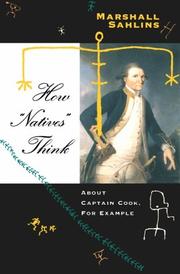Check nearby libraries
Buy this book

When Western scholars write about non-Western societies, do they inevitably perpetuate the myths of European imperialism? Can they ever articulate the meanings and logics of non-Western peoples? Who has the right to speak for whom? Questions such as these are among the most hotly debated in contemporary intellectual life.
In How "Natives" Think, the distinguished anthropologist Marshall Sahlins addresses these issues head on, while building a powerful case for the ability of anthropologists working in the Western tradition to understand other cultures.
In recent years, these questions have arisen in debates over the death and deification of Captain James Cook on Hawaii island in 1779. Did the Hawaiians truly receive Cook as a manifestation of their own God Lono? Or were they too pragmatic, too worldly-wise to accept the foreigner as a god? Moreover, can a "non-native" scholar give voice to a "native" point of view?
In his 1992 book, The Apotheosis of Captain Cook, Gananath Obeyesekere used this very issue to attack Sahlins's decades of scholarship on Hawaii. Accusing Sahlins of elementary mistakes of fact and logic, even of intentional distortion, Obeyesekere portrayed Sahlins as accepting a naive, ethnocentric idea of superiority of the white man over "natives" - Hawaiian and otherwise.
Claiming that his own Sri Lankan heritage gave him privileged access to the Polynesian native perspective, Obeyesekere contended that Hawaiians were actually pragmatists too rational and sensible to mistake Cook for a god.
Curiously then, as Sahlins shows, Obeyesekere turns eighteenth-century Hawaiians into modern Europeans, living up to the highest Western standards of "practical rationality." By contrast, Western scholars are turned into classic, custom-bound "natives," endlessly repeating their ancestral traditions of the white man's superiority by insisting Cook was taken for a Hawaiian god.
But this inverted ethnocentrism can only be supported, as Sahlins demonstrates, by wholesale fabrications of Hawaiian ethnography and history - not to mention Obeyesekere's sustained misrepresentations of Sahlins's own work. And in the end, although he claims to be speaking on behalf of "natives," Obeyesekere, by substituting a homemade "rationality" for Hawaiian culture, systematically eliminates the voices of Hawaiian people from their own history.
- How "Natives" Think goes far beyond specialized debates about the alleged superiority of Western traditions. The culmination of Sahlins's ethnohistorical research on Hawaii, it is also a brilliant demonstration of how to do anthropology by one of the discipline's most powerful minds.
Check nearby libraries
Buy this book

Previews available in: English
Subjects
Ethnology, Historiography, Attitudes, Ethnologists, Philosophy, Hawaiian mythology, History, Ethnology, polynesia, Hawaii, history, Ethnology, hawaii, Mythology, hawaiian, Etnologia, Mitologia hawaiiana, Filosofia, Etnologos, Actitudes, Antropologia cult social, Ontdekkingsreizigers, Mythologie, Etnocentrisme, Ethnologie, Philosophie, Ethnologues, Histoire, Historiographie, Explorers - biography, Hawaii - state & local history, Adventurers - general & miscellaneous - biography, Anthropology - general & miscellaneousTimes
To 1893Showing 1 featured edition. View all 1 editions?
| Edition | Availability |
|---|---|
|
1
How "natives" think: about Captain Cook, for example
1995, University of Chicago Press
in English
0226733688 9780226733685
|
aaaa
Libraries near you:
WorldCat
|
Book Details
Edition Notes
Includes bibliographical references (p. 287-301) and index.
Classifications
The Physical Object
ID Numbers
Community Reviews (0)
Feedback?| July 17, 2024 | Edited by MARC Bot | import existing book |
| December 19, 2023 | Edited by ImportBot | import existing book |
| March 8, 2023 | Edited by MARC Bot | import existing book |
| July 31, 2020 | Edited by ImportBot | import existing book |
| December 10, 2009 | Created by WorkBot | add works page |










